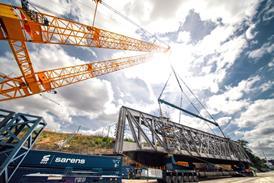August 7 - Volga-Dnepr is exploring the prospects for the development of a replacement super-heavy cargo transporter, which it hopes will be 35 - 40 percent more efficient than the Antonov AN-124, both technically and economically.
The Russian airline says the future market will need an aircraft with a minimum payload of 150 to 170 tons (136 to 154 tonnes) with a range of up to 10,000 km, which will enable it to perform a commercial non-stop flight across the Pacific Ocean, for example.
Volga-Dnepr analysts say the AN-124 aircraft, of which the carrier operates 12, will be fully depreciated and obsolete by 2040. In that time, the airline expects demand for oversized and super-heavy transport services to continue to grow, meaning the search for a replacement is a priority.
With the projected future market growth, and based on its own operational expertise and customer service experience, Volga-Dnepr has come up with a set of minimum requirements that the new super-heavy airlifter should satisfy.
The aircraft should be designed to comply with the International Civil Aviation Organization's (ICAO) requirements up to the year 2060, have 100 percent automated flight functionality, and feature more fuel-efficient powerplants compared to the AN-124's D-18 engines. The engines should resemble the Boeing 747-8's Genx-2B67, while outperforming it, says Volga-Dnepr.
Atryom Arutyunov, an adviser for the head of Russia's United Aircraft Corporation transport aircraft division, was in charge of drafting designs for the future aircraft.
Speaking with Russian Insider, Boris Rybak, head of Russia's Infomost Consulting, said the new super-heavy cargo aircraft would most likely be created by an international conglomerate.
"In this particular case, it would be prudent to combine the technical and project designing competence of Western countries with the experience of the Russian carrier in operating various types of cargo aircraft including ramp types," said Rybak.
Volga-Dnepr's technical director, Victor Tolmachev, believes that neither Russian nor foreign aircraft manufacturers currently have a viable project for a super-sized air freighter that would compete with the AN-124's performance levels. To make the future aircraft a reality, the design should start now, so that the initial serial-number aircrafts could stay in service until 2070, says Tolmachev.
In addition to exploring the possibilities of a new aircraft, Volga-Dnepr is devising technical specifications for the modernisation and continuation of its fleet of AN-124s and expanding its global presence.
By the end of 2017 Volga-Dnepr will have launched five operational bases across the globe, namely at Hanoi, Vietnam; London, UK; Leipzig, Germany; Houston, USA; and Sharjah, UAE.

















